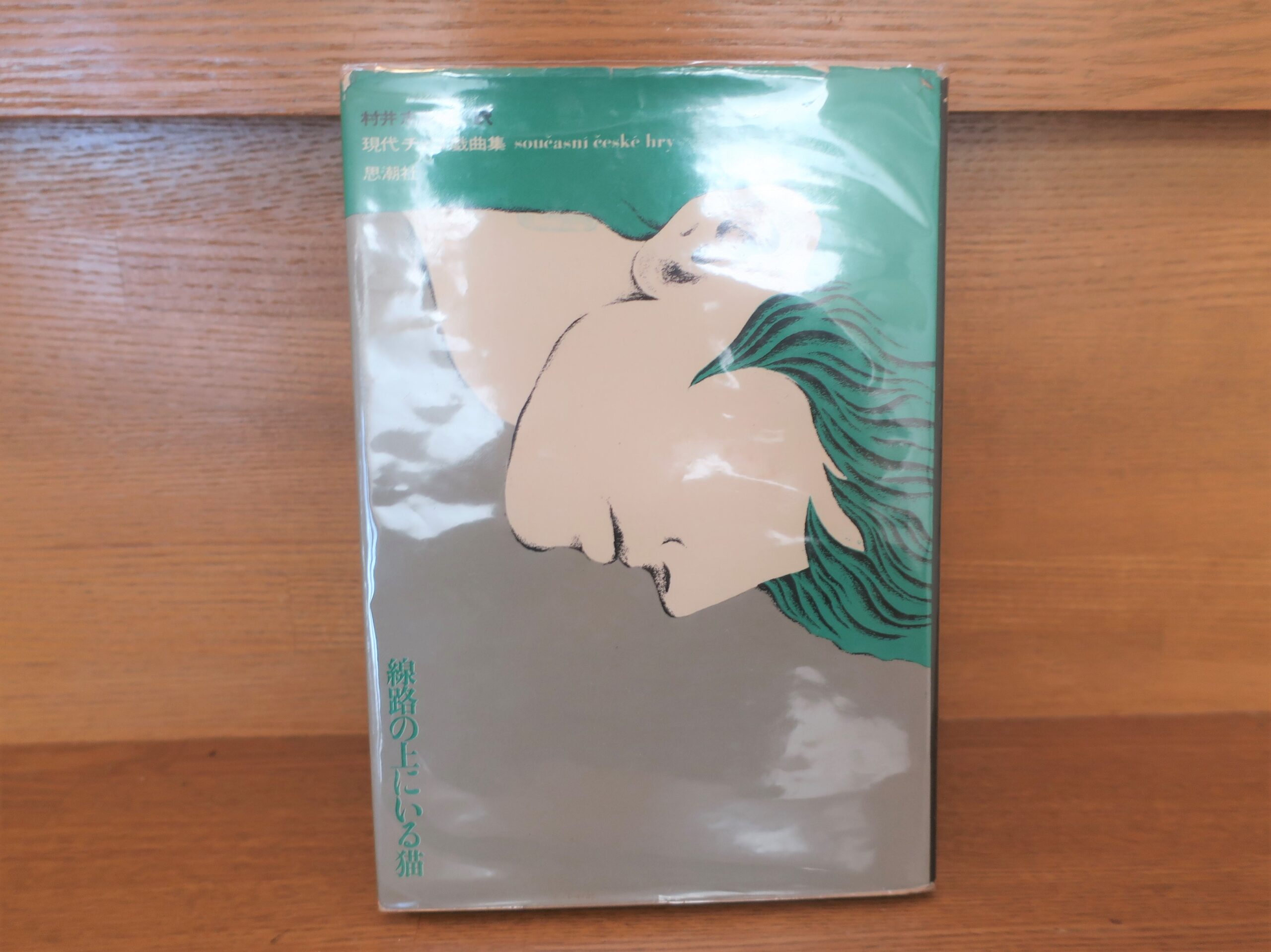A masterpiece by playwright Havel! Václav Havel, The Garden Party
The work presented here is "Garden Party," published by Václav Havel in 1963.
I read "Garden Party" in "The Cat on the Train Tracks: A Collection of Contemporary Czech Plays" translated by Shimako Murai and published by Shichosha in 1969.
Before we look at the book, let's look at a profile of the author, Václav Havel.
In 1989, Havel led the Velvet Revolution to democracy and became President of the Czechoslovak Republic (1989-92). He also served as the first President of the Czech Republic (1993-2003).
After World War II, the people of Czechoslovakia suffered under 40 years of communist oppression. In 1989, sparked by a group of students in Prague, Havel led the "Citizens' Forum" to support them. In 1989, students in Prague sparked a revolution that no one had thought possible.
In November 1989, over 50,000 citizens gathered in Wenceslas Square in the medieval capital of Prague, where Havel declared victory over the people using the phrase "truth will prevail" to express the country's traditional beliefs. It was called the "Velvet Revolution" because it was carried out like smooth velvet, without bloodshed. With the slogan "Havel na Hrad" (Havel to the Castle), the citizens pushed Havel to the presidential chair in Prague Castle.
NHK Publishing, Kenichi AbeVáclav Havel, "The Power of the Powerless," NHK 100 Minutes de Meitaku, February 2020than

Havel was a playwright who later became president of the Czech Republic.
He was born into a wealthy capitalist family and was severely persecuted by the Communist regime. The Garden Party" was written at a time when he managed to survive in the literary world by working behind the scenes.
Let's take a look at the editor's afterword for background on the writing of this book.
When he wrote "The Garden Party," he was still working backstage at the small theater Divadro na Zabrádély in Prague. He was a young man who made a deep impression on me when we were rehearsing a repertory called "The Heroes of the Taper" by the West German writer Huberleck at this theater under the direction of Krejča in 1962.
I was impressed by the way he was watching Krejcha's production as if he were eating into it while working as a lighting man. The general manager of the theater, Jan Grossman, a director and theorist, saw that the only way to turn this small theater, which sold pantomime fyrkas, into a theater that also presented plays, was by bringing the work of Krejča, a respected Czech director, to the flagship performance.
Because he was the son of a capitalist, Havel was denied admission to DAMU (Drama University) and worked as a backstage worker at this theater. He was the opposite of Topol, who came from an ordinary family and was allowed to enter DAMU, but was not satisfied with his schooling and joined E. P. Brillant's theater.
Grossman decided that in order to bring Havel to the world, it had to be directed by Krejcha, and in December of 1963, he had a premiere. In the Czech Republic, the Free Theatre, which was run by the duo of Voskovets and Weyrich at the time of E. F. Bryan (1918-39), had always dominated the popularity of Czechs at the time with its satirical musical comedies, but this "Garden Party" was the first time the Czech Republic had become a socialist society, The Garden Party was the first absurdist comedy to be created since the Czech Republic became a socialist society.
The theater, called Divadro na Zapradaury, was once a monastery, and its parapeted second-floor gallery, where monks used to walk, overlooks a stone courtyard. It is a small theater with seating for less than two hundred people. It seemed strange to me that such laughter erupted from this theater.
Shichosha, translated by Shimako Murai, "The Cat on the Train Tracks = A Collection of Contemporary Czech Plays," p. 242
Some line breaks have been made.
As the son of a capitalist, Havel was unable to attend the theater college he wanted to attend, so he continued his studies on his own while working backstage at the theater.
However, it was there that Havel emerged and was recognized by those around him and given the opportunity to showcase his work, as described above.
So what was the "Garden Party" about?
It comes from the actionaffectationandwrapped offering (of money)The cool laughter flowed out of that theater, not from the The place used as the auditorium used to be the monks' auditorium, with an old-fashioned sofa in the lobby, and a mantrobise fire in the corner on winter nights (renovated in 1987). (Renovated in 1967).
It is a theater with narrow stage sleeves and only good access in and out. The play, a sharp satire on bureaucracy and human relationships mechanized by the newly coined idiom of socialist society, ran for three long years. Tickets were sold out, and one had to make reservations a month in advance to get a good laugh out of it.
Havel became a popular figure in the Czech Republic. The laughter was so loud that tears welled up in the eyes of the audience, many of whom wiped their tears with handkerchiefs as they filled the lobby during intermission.
Shichosha, translated by Shimako Murai, The Cat on the Train Tracks: A Collection of Contemporary Czech Plays, p. 242-243
Some line breaks have been made.
."It comes from the actionaffectationandwrapped offering (of money)flowed out of that theater as cool laughter, not fromIt is important to say that "the
Havel's "Garden Party" is in the genre known as the absurdist drama.
It is not a straightforward comedy play, but rather surrealistic in any case.
The audience is made to laugh at the ill-conceived conversations, exchanges, and satire.
Moreover, the absurdity of this work by Havel is like a strange development, reminiscent of Kafka.
The characters are outlandish, their conversations seem to be normal and yet they don't quite mesh with each other, and somehow things seem to progress in spite of this.
It is as if a Kafkaesque worldview has been revived in Prague under Soviet repression.
The main plot of the story is about a family whose parents are worried about their son's job prospects. The parents continue to engage in a bizarre conversation that satirizes the mechanical bureaucracy of Soviet rule.
But the son is having none of it. And it is to the "garden party" that this rather smart son heads in order to get the job.
He visits the bureaucracy that hosts the garden party and begins a strange conversation with its officials.
The interaction here is far stranger than my parents.
People who cannot understand anything you say. They just repeat Soviet-like words that only they understand, or even they don't understand, and the conversation never progresses at all.
Havel satirizes Soviet-style bureaucracy by featuring these officials.
The son aloofly deals with them well, and in the end, he returns from the party in style.
It is extremely difficult to briefly summarize the synopsis and content of this piece. It is so absurd that I have no idea how to describe it.
However, if you like Kafka, you will certainly be hooked.
In fact, as the above quote indicates, this work was a big hit with the citizens of Prague.
."The play, a sharp satire on bureaucracy and human relationships mechanized by the newly coined idiom of socialist society, ran for three long years. Tickets were sold out, and one had to make reservations a month in advance to get a good laugh out of it.
Havel became a popular figure in the Czech Republic. The laughter was so loud that tears welled up in the eyes of the audience, many of whom wiped their tears with handkerchiefs as they filled the lobby during intermission. "
You can see how much laughter this production provided to the citizens of Prague.
Prague is a city with a deeply rooted "language" culture.
I think the power of this work is that it makes us feel the power of culture. I cannot go into the specifics here, but I am sure that if you read it, you will get a sense of this.
It is a wonderful example of Prague's high level of culture.
This work is probably almost unknown in Japan, but it is very interesting to get a sense of Prague culture. I am sure it will suit Kafka fans as well.
I recommend this work.
The above is "V. Havel's 'Garden Party' Recommended for Kafka Fans! A masterpiece of playwright Havel".
Next Article.
Click here to read the previous article.
Related Articles







































